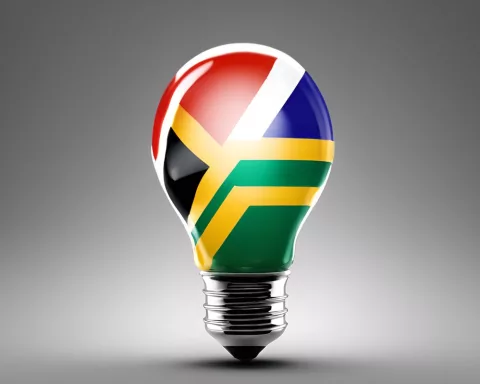South Africa’s 2024 National and Provincial Elections saw over 2.9 million voters participate in the registration process, with 2.7 million physically attending voting stations and almost 200,000 using the online portal. The Voter Management Device (VMD) facilitated over 800,000 live transactions and captured 1.8 million transactions for later processing. The highest number of registration transactions were recorded in Gauteng, KwaZulu-Natal, and the Eastern Cape, with females slightly outnumbering males at 52.52%. The online registration portal recorded almost 200,000 transactions during the Registration Weekend. The Electoral Commission’s dedication to fostering voter participation extends beyond the registration process and reflects its commitment to ensuring everyone, regardless of their circumstances, has the opportunity to register.
South Africa’s 2024 National and Provincial Elections saw over 2.9 million voters participate in the registration process, with 2.7 million physically attending voting stations and almost 200,000 using the online portal. The Voter Management Device (VMD) facilitated over 800,000 live transactions and captured 1.8 million transactions for later processing. The highest number of registration transactions were recorded in Gauteng, KwaZulu-Natal, and the Eastern Cape, with females slightly outnumbering males at 52.52%. The online registration portal recorded almost 200,000 transactions during the Registration Weekend.
Enthusiastic Voter Engagement and Technological Advancements
South Africa procured an impressive democratic display as the Electoral Commission’s report highlights that more than 2.9 million voters actively participated in the registration procedure for the 2024 National and Provincial Elections occurring from 18 to 19 November 2023. Of this number, a remarkable 2.7 million citizens physically attended voting stations, a reflection of South Africa’s unwavering devotion to democratic involvement. Meanwhile, almost 200,000 people leveraged the online portal, indicating an increasing reliance on technology in this domain.
The Electoral Commission has, in recent times, led the cause to modernize and digitize the registration process. The innovation of the Voter Management Device (VMD) has critically enhanced the agility and effectiveness of the voter registration process. The VMD facilitated over 800,000 live transactions and captured 1.8 million transactions for later processing, showcasing its potential to transform voter registration.
In an era where technology profoundly impacts every segment of society, such technological advancements are particularly significant. The successful application of the VMD underscores how technology can bolster democratic processes, safeguarding their relevance and ease of accessibility in an ever-increasing digital world.
Encouraging Youth Participation and Gender Representation
The demographic distribution of the newly registered voters presents insightful data. Out of the 568,374 new voters, 445,089 are young individuals aged between 16 and 29, comprising nearly 80% of the newly registered voters. This statistic is particularly uplifting, suggesting that the Electoral Commission’s focused endeavors to engage the youth are yielding positive results.
A closer look at the gender composition of new registrations discloses an intriguing pattern with females slightly outnumbering males at 52.52%. This trend underscores the longstanding narrative of women’s amplified involvement in the electoral process, signifying their dynamic role in sculpting the country’s destiny.
The regional allocation of registrations exhibits that the provinces recording the highest number of registration transactions are Gauteng, KwaZulu-Natal, and the Eastern Cape, with Gauteng remaining the largest voting bloc, hosting 6.2 million registered voters.
Online Registration Success and Commitment to Accessibility
The online registration portal of the Electoral Commission, unveiled in July 2021, has demonstrated its viability as an alternative to traditional registration methods, recording almost 200,000 transactions during the Registration Weekend. The provinces experiencing the highest online registrations were Gauteng, the Western Cape, and KwaZulu-Natal, reflecting the pattern observed in the overall registration statistics. Predictably, these sites also demarcate the country’s most affluent and urbanized areas, mirroring heightened levels of internet connectivity and technological utilization in these regions.
The Electoral Commission has exhibited a laudable commitment to rectify minor hitches, such as the ‘pending’ message some voters received. By advising voters to meticulously follow system prompts when uploading their ID images, the Commission is working relentlessly to ensure a user-friendly process.
The Commission’s dedication to fostering voter participation extends beyond the registration process. It offers numerous resources, including an SMS line and a contact center, to aid citizens with their registration inquiries. The Commission also encourages those managing frail-care facilities and home-bound individuals to get in touch, reflecting its commitment to ensuring everyone, regardless of their circumstances, has the opportunity to register.
The Commission’s unwavering efforts, coupled with South Africa’s enthusiastic response, serve as a powerful testament to the country’s strong democratic spirit. By embracing technology and endeavoring to make the registration process as inclusive as possible, the Electoral Commission is laying the groundwork for an even more dynamic and engaged electorate in the future. The high levels of participation observed during the registration process indicate promising prospects for the vibrancy of South Africa’s democracy, portending well for the forthcoming 2024 National and Provincial Elections.
How many voters participated in South Africa’s 2024 National and Provincial Elections registration process?
Over 2.9 million voters participated in the registration process, with 2.7 million physically attending voting stations and almost 200,000 using the online portal.
How did the Voter Management Device (VMD) enhance the voter registration process?
The VMD facilitated over 800,000 live transactions and captured 1.8 million transactions for later processing, showcasing its potential to transform voter registration.
What is the demographic distribution of newly registered voters in South Africa?
Out of the 568,374 new voters, 445,089 are young individuals aged between 16 and 29, comprising nearly 80% of the newly registered voters.
Which provinces recorded the highest number of registration transactions?
The provinces recording the highest number of registration transactions are Gauteng, KwaZulu-Natal, and the Eastern Cape, with Gauteng remaining the largest voting bloc, hosting 6.2 million registered voters.
How successful was the online registration portal of the Electoral Commission?
The online registration portal recorded almost 200,000 transactions during the Registration Weekend. The provinces experiencing the highest online registrations were Gauteng, the Western Cape, and KwaZulu-Natal, reflecting the pattern observed in the overall registration statistics.
What is the Electoral Commission’s commitment to accessibility?
The Commission offers numerous resources, including an SMS line and a contact center, to aid citizens with their registration inquiries. The Commission also encourages those managing frail-care facilities and home-bound individuals to get in touch, reflecting its commitment to ensuring everyone, regardless of their circumstances, has the opportunity to register.











